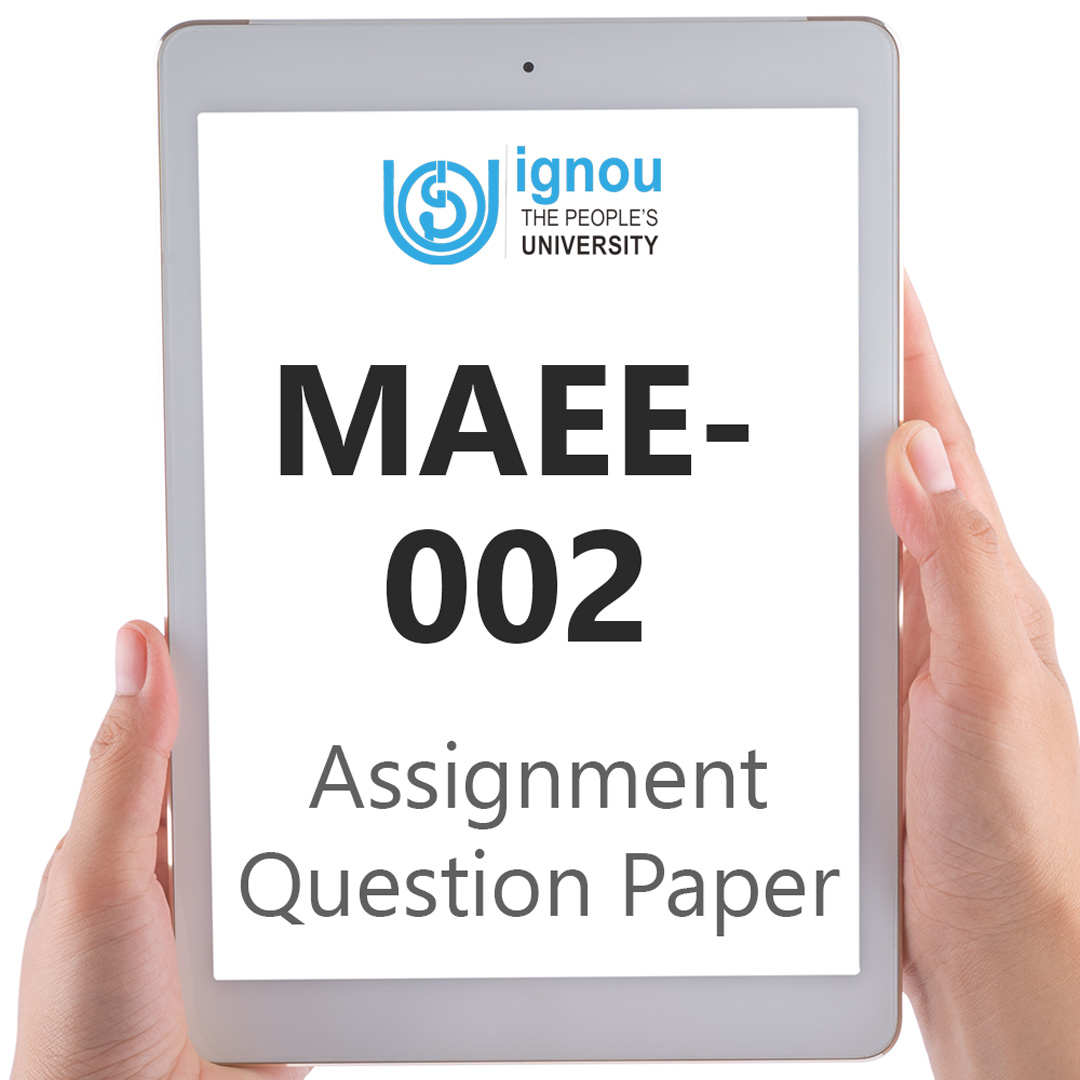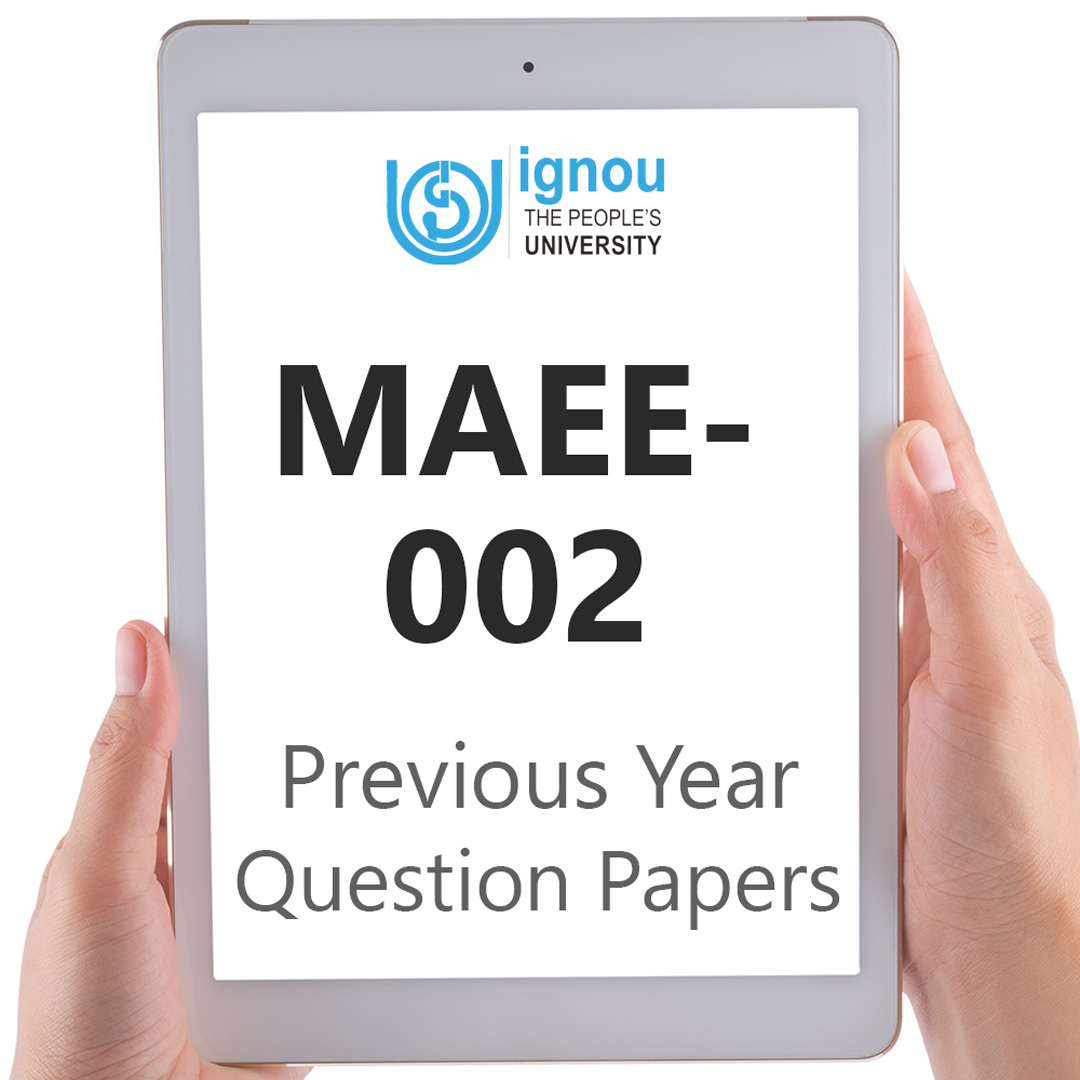If you are looking for MAEE-002 IGNOU Solved Assignment solution for the subject Basics of Legal Awareness, you have come to the right place. MAEE-002 solution on this page applies to 2022-23 session students studying in MAAE courses of IGNOU.
MAEE-002 Solved Assignment Solution by Gyaniversity
Assignment Code: MAEE-002/TMA/2022-23
Course Code: MAEE-002
Assignment Name: Basics of Legal Awareness
Year: 2022-2023
Verification Status: Verified by Professor
Answer the following questions in about 500 words each.
Q1) Explain the basic principles of Law with special reference to Democracy.
Ans) The basic principles of Law with special reference to Democracy are as follows:
Citizen Participation
Participation by citizens can take many different forms, such as running for office, casting a ballot, learning about problems, participating in debates, attending civic or community meetings, joining private non-profit groups, paying taxes, and even protesting. A better democracy is created via participation.
Equality
Democratic cultures place a strong emphasis on the idea of equality for all. All people must be treated similarly, given equal chances, and free from prejudice based on their colour, religion, ethnicity, gender, or sexual orientation for there to be equality.
Religious Tolerance
Political tolerance is a feature of democratic society. The ability to organise and voice out must be granted to those who lack authority. Because they may have opinions that differ from those of the majority, minorities are occasionally referred to as the opposition. Additionally, every citizen must develop tolerance for one another. People from various racial, religious, and ethnic groups who hold opinions different from those of the majority of the community are frequently found in democratic societies.
Accountability
Both elected and appointed officials must answer to the people in a democracy. They bear accountability for their deeds. The wants and desires of the people, not their own, must guide officials' actions and how they carry out their obligations.
Transparency
A transparent government invites citizens to attend public meetings. In a democracy, the public and the press have access to information about the decisions being taken, including who is making them and why.
Regular, Uncontested Elections
Most adults should have the ability to run for public office in order for elections to be free and fair. Furthermore, there shouldn't be any barriers that make it impossible for people to cast ballots.
Economic Liberty
It's up for argument what role the government should play in the economy, but it's generally agreed that democracies should have free markets and that the government shouldn't run everything.
Prevention of Power Abuse
By having independent courts and agencies with the authority to intervene against any illegal action by an elected official or branch of government, by allowing for citizen participation and elections, and by monitoring for police power abuse, the government is set up to limit the powers of its branches.
Chart of Rights
A bill of rights is a set of freedoms and rights that are promised to everyone in the nation. The courts have the authority to uphold the rights that are included in a country's constitution.
Accepting the Election Results
Elections in democracies produce victors and losers. A government that is ineffectual and unable to make decisions could result from refusing to recognise the outcome of an election. Violence, which is also against democracy, could even result.
Rights of People
Every person is valued in a democratic society. Human rights encompass things like the freedoms of speech, association, and assembly as well as the rights to equality and education.
Various Parties System
A multi-party system makes it possible for the party that wins the election to face opposition. This aids in giving the government several points of view on problems. A multiparty system additionally gives voters a selection of candidates, parties, and policies to choose from.
The Law is Supreme
Even a king or an elected president are not exempt from the rule of law in a democracy. The rule of law is what we call this. It implies that everyone must abide by the law and will face consequences if they do not. Democracy also demands that the law be applied consistently, fairly, and equally. The phrase "due process of law" is occasionally used to describe this.
Q2) Critically analyse the provisions made in the Right of Children to Free and Compulsory Education Act, 2009 with special reference to duties of Government, Local Authority and Parents.
Ans) The following are the responsibilities set forth in the Act for the government, local government, and parents:
Section 6: Duty of Appropriate Government and Local Authority to Establish School: The competent government and local authority shall establish a school where it is not already established within three years of the act's enactment.
Section 7: Sharing of Financial and Other Responsibilities: These are as follows:
Central and state governments are responsible for funding this Act.
The Central Government prepares capital and recurrent spending estimates for Act implementation.
The Central Government should provide to the State Governments, as grants in-aid of revenues, such percentage of sub-section (2) expenditures as it may determine in agreement with the State Governments.
The Central Government may urge the President to refer to the Finance Commission under subclause (d) of clause (3) of Article 280 to review the necessity for extra resources to be allocated to any State Government so that it may provide its share of funds for carrying out the Act.
Despite subparagraph (4), the State Government is responsible for providing funding for Act implementation, using Central Government grants and other resources.
Section 8: Duties of Appropriate Government: Every child must have free, mandatory primary schooling.
Where a child is admitted by his or her parents or guardian to a school other than one established, owned, controlled, or substantially financed by funds provided directly or indirectly by the appropriate Government or a local authority, such child or his or her parents or guardian shall not be entitled to make a claim for reimbursement of elementary education expenses to such other school.
Section 6 requires a nearby school.
Make sure weaker and disadvantaged children aren't prohibited from completing primary school.
Provide a school building, teachers, and equipment.
Section 4 training facility
Monitor every child's elementary school admittance, attendance, and completion.
Ensure primary education meets Schedule standards and norms.
Ensure timely curriculum prescribing and teacher training for elementary education.
Section 9: Duties of Local Authority: Every local authority shall:
Free and mandatory elementary school for all If a child is admitted by his or her parents or guardian to a school other than one established, owned, controlled, or substantially financed by funds provided directly or indirectly by the appropriate Government or a local authority, the child or his or her parents or guardian shall not be entitled to reimbursement of elementary education expenses incurred in such other school.
Ensure a Section 6 neighbourhood school is available.
Ensure that weaker and underprivileged children are not discriminated against and stopped from pursuing primary education.
Maintain records of minors up to 14 years old in its authority as prescribed.
Every child in its jurisdiction is admitted, attends, and completes primary school.
School building, teachers, and learning materials provided.
Provide Section 4 training facilities.
Ensuring high-quality primary education that meets Schedule standards.
Timely prescribing of elementary curricula and courses.
Offers teacher training and also allows migrant kids in.
Monitor school performance and the academic calendar.
Section 10: Duty of Parents and Guardian: Every parent or guardian must enrol their child or ward in the neighbourhood primary school.
Q3) What are the policies relating to the rights of persons with disabilities in India? Do you think the implementation of these policies at different levels is in tune with the national perspective of the same? Give reasons thereof.
Ans) The following essential rights for people with disabilities are protected by the Constitution:
The Constitution guarantees all people, including those who are disabled, the right to justice, freedom of expression, belief, and religion, as well as equality of status and opportunity and support for brotherhood.
According to Article 15 (2), no citizen shall be subjected to any disability, liability, restriction, or condition on any of the aforementioned grounds with regard to their access to stores, public restaurants, hotels, and places of public entertainment or with regard to their use of wells, tanks, bathing ghats, roads, and places of public resort maintained entirely or in part with money provided by the government or designated for the use of the general public. Women, children, members of any socially or educationally disadvantaged class, as well as members of the Scheduled Castes and Tribes, may benefit from special laws or rules made by the state.
In terms of employment or appointment to any office under the State, there shall be equality of opportunity for all citizens (including the disabled).
No one, particularly the disabled, should be treated as untouchable regardless of their affiliation. It would be illegal, as defined by Article 17 of the Constitution, and punishable by law.
According to Article 21 of the Constitution, everyone's right to life and liberty is guaranteed, including people with disabilities.
There can be no human trafficking (including the trade in disabled individuals), and forced labour, begging, and other forms of labour are illegal and subject to legal penalties (Article 23).
Article 24 forbids the employment of children under the age of 14 in factories, mines, or other hazardous occupations. Even a private contractor working for the government is not allowed to employ minors under the age of 14.
Every person, including those with disabilities, is guaranteed the right to freedom of religion under Article 25. Every disabled person has the right to practise and spread their faith, so long as it is done in accordance with good order, morality, and health.
No individual with a disability may be made to pay taxes in order to support and maintain a certain religion or religious organisation.
No individual with a disability will be denied the right to use the language, script, or culture that he or she possesses or is a part of.
Every disabled person in India has the right to petition the Supreme Court of India to uphold their fundamental rights, and Article 32 itself guarantees that right.
Although the right to own property is not a fundamental right, no disabled person who owns property can have it taken away from him without a court's permission. Any unlawful taking of property may be contested in court and compensated for damages.
Upon becoming 18 years old, every disabled person becomes eligible to have his name added to the general electoral roll for the geographical constituency to which he belongs.
Implementation of these Competencies, and strategies, will build a stronger public health workforce skilled in ways to include people with disabilities in public health planning efforts and reduce health disparities for this population.





